June 1913
| << | June 1913 | >> | ||||
|---|---|---|---|---|---|---|
| Su | Mo | Tu | We | Th | Fr | Sa |
| 1 | 2 | 3 | 4 | 5 | 6 | 7 |
| 8 | 9 | 10 | 11 | 12 | 13 | 14 |
| 15 | 16 | 17 | 18 | 19 | 20 | 21 |
| 22 | 23 | 24 | 25 | 26 | 27 | 28 |
| 29 | 30 | |||||
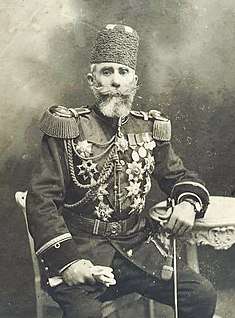
June 11, 1913: Ottoman Grand Vizier Shefket Pasha assassinated in drive-by shooting
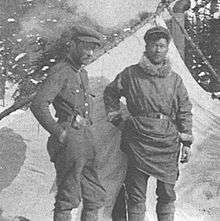
June 7, 1913: Four-man team becomes first to climb to the top of North America's highest mountain
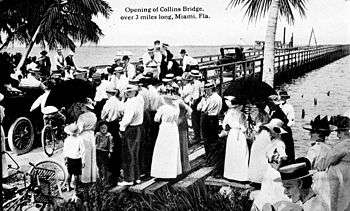
June 12, 1913: New bridge transforms Miami, Florida, into world-famous tourist attraction
The following events occurred in June 1913:
June 1, 1913 (Sunday)
June 2, 1913 (Monday)
- After U.S. President Woodrow Wilson warned the public about the money being spent by lobbyists to fight tariff reform, the U.S. Senate ordered its Judiciary Committee to prepare a report with "the names of all lobbyists attempting to influence such pending legislation and the methods that they have employed to accomplish their ends". Over the next six days, the 96 Senators were required to appear before a special subcommittee and to state, under oath, whether they had a financial interest in the outcome of any pending bills.[2]
- The town of Winona Lake, Indiana, was incorporated[3].
- Born: Barbara Pym, British novelist, as Mary Crampton, in Oswestry (d. 1980)
- Died: Alfred Austin, 78, British Poet Laureate since 1896.
June 3, 1913 (Tuesday)
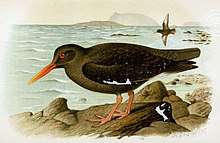
The Canarian Oystercatcher, now extinct
- The last known specimen of the Canary Islands oystercatcher (Haematopus meadewaldoi) was caught, then released, by British ornithologist D. A. Bannerman. Possible sightings were reported as late as the 1960s, but the bird is considered extinct.[4]
- Mexican rebels, commanded by General Lucio Blanco, captured Matamoros, Tamaulipas, across the Rio Grande from Brownsville, Texas.[5][6]
- Russian composer Igor Stravinsky, and his wife Yekaterina, ate oysters for dinner, and then fell ill with typhus and were incapacitated for more than a month.[7] p132
- Born:
- Charles H. Fairbanks, American archaeologist, in Bainbridge, New York (d. 1984)
- George Hourani, British philosopher and classicist, in Didsbury (d. 1984)
June 4, 1913 (Wednesday)
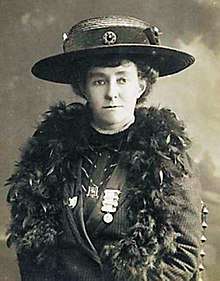
Emily Wilding Davison
- Suffragette Emily Davison was fatally injured when she ran in front of Anmer, the racehorse owned by King George V, in the running of the Epsom Derby. Davison came from out of the stands, ducked under a railing and past police, and ran out in front of the horse, who was in last place. Herbert Jones, who was riding Anmer, was thrown and was unconscious for two hours, while Davison was trampled by the horse and never woke up.[8] She died four days later.[9]
- The Epsom Derby was won by Aboyeur, who had 100 to 1 odds against him and had finished in second place behind the favorite, Cragonour. After Cragonour was announced as the winner, an objection was raised by race stewards, because American jockey Johnnie Reiff had bumped other horses on the way to the finish.[10]
- Prime Minister László Lukács of Hungary and his cabinet resigned. Count István Tisza was asked by Austro-Hungarian Emperor Franz Joseph to form a new cabinet.[6][11]
- In Chicago, world heavyweight boxing champion Jack Johnson was sentenced to one year and one day in prison at Joliet, Illinois, after being found guilty of violating the Mann Act. He was also given two weeks to seek a reconsideration.[12]
- Shoeless Joe Jackson, at that time a player for the Cleveland Indians, in a game against the New York Yankees, hit what was believed to be "the longest home run ever hit in the major leagues up to that time".[13]
June 5, 1913 (Thursday)
- The Modest Mussorgsky opera Khovanshchina premiered at the Théâtre des Champs-Élysées.[14]
- Born: Nam Il, Foreign Minister of North Korea, 1953–1967, in Russia (d. 1976)
- Died: Chris von der Ahe, 61, German-born brewer and baseball team owner
June 6, 1913 (Friday)
- Prince Albert Frederick George, the 17-year-old son of King George V, and the future King George VI of the United Kingdom, made his first visit to the United States, crossing the border from Canada into Niagara Falls, New York. Prince Albert, who was in Canada with 60 cadets from the HMS Cumberland, wasn't immediately recognized in the crowd, but told reporters later that "This is my first trip to the continent and the first time I have stood under the Stars and Stripes on American soil."[15]
- Carlo L. Golino, Italian-American scholar, in Pescara (d. 1991)
June 7, 1913 (Saturday)
.jpg)
Denali, formerly Mount McKinley, formerly Denali
- Archdeacon Hudson Stuck and a team of mountaineers (Harry Karstens, Robert Tatum and Walter Harper) became the first persons to reach the top of North America's highest mountain, the 20,156 feet (6,144 m) high Mount McKinley (now called by its original name, Denali) in Alaska. Harper, born in Alaska and son of an Athabaskan mother, was the first of the group to reach the summit. The feat was reported on June 20.[16]
- United Mine Workers President John P. White and 18 other union officials were indicted by a federal grand jury in Charleston, West Virginia, on charges of violating the Sherman anti-trust law.[17]
- The world's largest swimming pool, as wide as a city block (400 feet) and twice as long (600 feet), opened at Palisades Amusement Park in New Jersey. The pool, made of cement, was constructed by park owners Nicholas Schenck and Joseph Schenck.[18]
June 8, 1913 (Sunday)
- Thirty thousand German athletes attended the dedication of the Deutsches Stadion at Grunewald, near Berlin, which was scheduled to host the 1916 Summer Olympics games (which did not take place)[6][19][20]
- Died: Emily Davison, British suffragette (b. 1872); and Charles Augustus Briggs, 72, American theologian and Biblical scholar
June 9, 1913 (Monday)

John Maynard Keynes
- John Maynard Keynes, whose theories of economics would have worldwide impact, published his first book, Indian Currency and Finance.[21]
- Born: Dr. Patrick Steptoe, British obstetrician and gynecologist who, with Robert G. Edwards, pioneered in-vitro fertilization; in Oxford (d. 1988)
June 10, 1913 (Tuesday)
- The U.S. Supreme Court upheld the constitutionality of the law requiring newspapers to publish statements of circulation and ownership, and to mark advertising plainly.[6]
- Anna Johnson of Colfax, Wisconsin, became the first blind graduate of the Wisconsin School for the Deaf at Delavan, Wisconsin. Miss Johnson, who was blind, deaf and mute "with the further handicap of being minus one lower limb" had achieved honors in literature and history, and had plans to attend Gallaudet College.[22]
- Born:
- Benjamin Shapira, a German-born Israeli biochemist and recipient of the Israel Prize (d. 1993)
- Wilbur J. Cohen, U.S. Secretary of Health Education and Welfare 1968–1969, in Milwaukee (d. 1987)
- Tikhon Khrennikov, Soviet composer, in Yelets, Russian Empire (d. 2007)
- John Edmunds, American composer, in San Francisco (d. 1986)
June 11, 1913 (Wednesday)
- Turkish Grand Vizier Mahmud Shevket Pasha was assassinated in Istanbul. Shefket Pasha was being driven from the Ministry of War in a car, when another car pulled alongside him and ten shots were fired. Said Halim Pasha, the Foreign Minister, was appointed as his successor.[23] Twelve "real or alleged plotters" were arrested, and hanged on June 24.[24]
- The five-day long Battle of Bud Bagsak started in the Philippines when U.S. Army General John J. "Black Jack" Pershing lead a combined force of American soldiers, Philippine Scouts and the Philippine Constabulary against a contingent of 500 Moro warriors. Chiefs Naquib Amil, Jami and Sahipa sent word that they would not surrender.[25][26]
- A record of 36 hours underwater was set by the Cage, a submarine invented by John Milton Cage, Sr., who had taken the boat down at 5:00 in the morning the day before, along with five other men.[27]
- The German ocean liner SS Imperator, largest in the world at the time, was launched from Hamburg.[28]
- Born:
- Vince Lombardi, American NFL head coach who led the Green Bay Packers to multiple championships, including the first two Super Bowls; in Brooklyn (died of cancer, 1970)
- Risë Stevens, American mezzo-soprano, in New York City (d. 2013)
June 12, 1913 (Thursday)
- Billed as "the longest wooden bridge in the world", the 2.5 mile long Collins Bridge opened, turning the small town of Miami, Florida (1910 population 5,471) into a premier resort area by making Miami Beach more accessible to more tourists. Previously, the beach could only be reached from the mainland by ferry boat and was impractical as an investment.[29]
- Klaus Berntsen resigned as Prime Minister of Denmark.[6]
- The death of 30 crewmen on a Spanish gunboat that had run aground in Morocco, at the hands of a group of rebellious Berber tribesmen, the Kabyle rebels, was revealed.[6]
- Even as both nations were preparing to go to war with each other, Serbia and Bulgaria agreed to Russian arbitration of their dispute over the territories captured during the First Balkan War.[30]
- Said Halim Pasha was appointed as the new Turkish Grand Vizier, serving until February 3, 1917.[31]
- John R. Bray, an American animator, premiered the innovative cartoon The Artist's Dream, which an author would later say was "the forerunner of the cartoon vogue" as the first popular animated film.[32]
June 13, 1913 (Friday)
- The U.S. Senate Committee on Woman Suffrage reported favorably on a proposed amendment to the U.S. Constitution providing that the right to vote shall not be denied because of gender.[33]
- Attorney Walton J. Wood began work as the first public defender in the United States, earning $200 a month as an employee of Los Angeles County, California, to represent persons who could not afford a lawyer.[34]
- The U.S. government successfully broke up the monopoly held by gunpowder manufacturer E.I. du Pont de Nemours and Company (more commonly called DuPont). The corporation was split into three competing companies, DuPont (which would diversify into chemical manufacturing), Hercules Powder Company and Atlas Powder Company.[35]
- On the same day, the DuPont Cellophane Company, owned 52 percent by DuPont, was formed in partnership with a French consortium, for the American manufacture of the new French product, transparent cellophane sheets.[36]
- Died: Camille Lemonnier, 69, Belgian journalist and poet.
June 14, 1913 (Saturday)
- Eleven construction workers for the Bradley Contracting Company were killed in the cave-in of new subways underneath Fifty-sixth Street in New York City.[37]
- The German battlecruiser Derfflinger, first of its class and the most powerful German battleship up to that time, was launched. Moments after it was christened by the wife of General August von Mackensen, the ship moved only fifteen inches down the skids before it came to a halt, jammed because of a defect in one of the sledges.[38]
- The South African government passed the Immigration Act, which restricted the immigration of people from India.[39]
June 15, 1913 (Sunday)
- Driven out by shelling from American and Philippine troops during the Battle of Bud Bagsak, the 500 Moro defenders made a charge against the firepower of the Pershing contingent's artillery, and were killed. Pershing's troops sustained 27 casualties.[40] The uneven battle brought an end to the Moro resistance with the deaths of 2,000 Moro defenders, including women and children, as well as the death of 340 American troops.[41]
June 16, 1913 (Monday)
- Kaiser Wilhelm II celebrated the 25th anniversary of his ascension to the throne in 1888. "Twenty-five years of peace", the Kaiser told American industrialist and peace delegate Andrew Carnegie, "and I hope there will be twenty-five more".[26] Germany would enter World War I less than fourteen months later. Half a million people lined the streets of Berlin to cheer the Kaiser and the Kaiserin. The Kaiser proclaimed an amnesty for "those whose misdeeds were committed through poverty or while in a state of irresponsibility", and for Army and Navy men punished for most violations of regulations.[42]
- Died: Della Fox, 40, American comedian from the 1880s and 1890s
June 17, 1913 (Tuesday)
- The first round of elections in the Netherlands began for 54 of the 100 seats in the Tweede Kamer. The other 46 would be decided the following Sundayweek.[43]
- The Welsh Disestablishment Bill was passed on its second reading, by the British House of Commons, after having been reintroduced following rejection in the House of Lords.[44] The Act, which would become law in 1914, provided for the Church of England to be disestablished in Wales in favor of a separate Church in Wales.
June 18, 1913 (Wednesday)
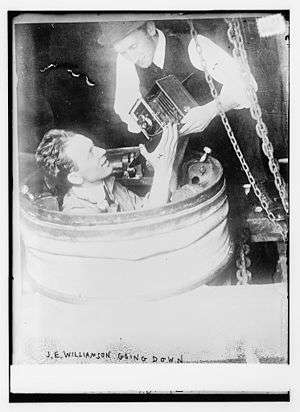
Williamson taking his camera undersea
- John Ernest Williamson, whose father had invented a transparent diving bell called the "photosphere", became the first person to take photographs from beneath the ocean surface, by taking a camera with him and snapping pictures while underwater inside the bell.[45]
- The Arab Congress of 1913 opened, during which Arab nationalists meet to discuss desired reforms under the Ottoman Empire.[46]
- The Hamburg-American ocean liner Imperator, the largest ship in the world, arrived safely in New York on its maiden transatlantic voyage.[47]
- French Algeria's Governor-General Charles Lutaud abolished the requirement for natives to obtain travel permits within Algeria, or from Algeria to mainland France.[48]
- Born:
- Sylvia Porter, American economist and journalist (d. 1991)
- Robert Mondavi, American winemaker (d. 2008)
- Died: Thomas Janvier, 63, American historian and short story writer
June 19, 1913 (Thursday)
- The Parliament of South Africa passed the Natives Land Act, defining which areas could be owned by white South Africans, and which by black South Africans. Black South Africans were barred from purchasing or owning white persons' property.[49]
- The British House of Commons voted, 346-268, to acquit Attorney General Rufus Isaacs and Chancellor of the Exchequer David Lloyd George on charges of malfeasance arising from ownership of shares in the Marconi Company of America.[26]
- Thirteen people were killed in the collision of two trains near Vallejo, California.[50]
- Italian occupying forces fought a fierce battle against the Arab residents of Libya, at Ettangi, Tripolitania.[51]
- Maurice Prévost set a new airplane speed record, averaging 117 miles per hour in a flight of over 217 miles, in a circular course near Paris.[52]
June 20, 1913 (Friday)
- Australia's Prime Minister Andrew Fisher resigned after the defeat of the Australian Labor Party in parliamentary elections.[53][54]
- Romania mobilized its armed forces in preparation for an invasion of Bulgaria.[55]
- Ernst Schmidt shot five young girls in a school in Bremen.
- Born: Lilian Jackson Braun, American mystery writer known for the "Cat Who series", starting in 1966 with The Cat Who Could Read Backwards; in Chicopee, Massachusetts (d. 2011)
- Died:
- Major Sydenham Ancona, 89, U.S. Representative for Pennsylvania from 1861 to 1867 and the last surviving member of Congress to have participated in the voting on the American Civil War in 1860
- Sir Frederick Johnstone, Earl of Annandale, 72, former British MP (1874–1885) and sportsman whose horses won the Epsom Derby in 1883 and 1892.
June 21, 1913 (Saturday)
.jpg)
Tiny Broadwick's safe landing
- Georgia Thompson "Tiny" Broadwick became the first woman to parachute from an airplane, jumping from a plane piloted by aviator Glenn L. Martin over Los Angeles. Broadwick had volunteered to test Martin's invention of a "trap seat" that would allow people to bail out of an airplane more quickly.[56]
- Carl Theodor Zahle, who previously had served as Konseilspræsident (Council President, or Prime Minister of Denmark), formed a new cabinet to succeed Klaus Berntsen.[57]
- Born: Jim Cavanagh, Australian Senator for South Australia (1962–1981), Minister for Aboriginal Affairs (1973–75), near Adelaide (d. 1990)
.jpg)
Nash
- Died: Charles E. Nash, 69, first African-American Congressman for Louisiana, in the U.S. House of Representatives, 1875–1877 during the Reconstruction Era
June 22, 1913 (Sunday)
- Serbia's Prime Minister Nikola Pašić and his cabinet resigned because of the nation's lack of progress in negotiating with Bulgaria, after which the Serbian minister left Sofia. Pašić formed a new government when the Second Balkan War broke out days later.[26]
- Died: Henry Cox Jones, 94, the last surviving member of the Confederate States of America Congress, having served as a C.S. Representative for Alabama from 1861 to 1862.
June 23, 1913 (Monday)
- U.S. President Wilson addressed a joint session of Congress on his support of the McAdoo-Owen-Glass Banking Bill, and the need to create a federal reserve system for banking.[58] The legislation would pass at the end of the year as the Federal Reserve Act.[59]
- The first of 32 men were hanged for the assassination of Turkish Grand Vizier Shefket Pasha.[26]
- The predecessor of the Aldi store chain was opened by Anna Siepmann (later Anna Albrecht) in Schonnebeck, a suburb of Essen in Germany. In the 1920s, after marrying a coal miner, she would give birth to two sons, Karl Albrecht and Theo Albrecht, who would, on July 10, 1946, create the discount grocery store called Albrecht Diskont, before using the first two syllables to coin the name (in 1962) to Aldi.
- Born:
- William P. Rogers, U.S. Secretary of State 1969–73, and U.S. Attorney General 1957–61, in Norfolk, New York (d. 2001)
- Nathan Abshire, American Cajun musician, in Gueydan, Louisiana (d. 1981); Helen Humes, American jazz and blues singer, in Louisville, Kentucky (d. 1981)
- Carlos A. Cooks, Dominican-American black nationalist, in Santo Domingo (d. 1966)
- Died:
- General Nicolás de Piérola, 72, former President of Peru, 1896–1899
- Sir Jonathan Hutchinson, 85, British physician and expert in leprosy.
June 24, 1913 (Tuesday)
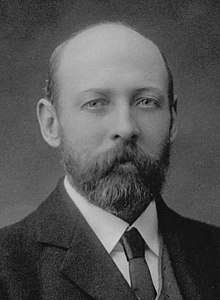
Joseph Cook, Prime Minister of Australia
Former Prime Minister Andrew Fisher
- Joseph Cook was sworn in as the sixth Prime Minister of Australia after being requested by Governor-General Denman to form a new government.[26]
- The explosion of a grain elevator at Buffalo, New York, killed 17 men and injured 50 others.[60]
- Prime Minister Zahle announced in the Rigsdag that he would lobby for women's suffrage in Denmark.[26]
- Born: Vincent Ferrini, American poet, in Saugus, Massachusetts (d. 2007)
June 25, 1913 (Wednesday)
- Less than a month after they had fought as allies in the First Balkan War, Bulgaria and Serbia battled each other at Zletovo.[61]
- The results of Dutch elections showed that the Liberal Party had obtained a 55-45 majority in the Chamber of Deputies.[26]
- Germany's Reichstag passed the German Nationality Law.[62]
- Astronomer Henry Norris Russell of Princeton University announced his discovery of a correlation between the total radiation of a star and its temperature.[63]
- Born: Cyril Fletcher, British comedian, in Watford (d. 2005)
June 26, 1913 (Thursday)
- The Washington Senators hosted the Philadelphia Athletics for a baseball doubleheader, and batted first in the second game at D.C., a departure from the rule that the visitors start off the game at bat. The Athletics won 10-3. The oddity would not happen again for 94 years, until September 26, 2007, in Washington state, when the Seattle Mariners hosted the Cleveland Indians and batted first, in a game which Cleveland would win 12-4.[64]
- The city of Avalon, California, was incorporated.[65]
- Born: Aimé Césaire, French Martinican poet and politician (d. 2008); and Maurice Wilkes, British computer scientist (d. 2010)
- Died: Cromartie Sutherland-Leveson-Gower, 4th Duke of Sutherland, 61, "largest landowner in Europe except the Czar", with 1,385,000 acres of land, or more than 2,100 square miles.[66]
June 27, 1913 (Friday)
- Theo Heemskerk resigned as Prime Minister of the Netherlands.[26]
- Born:
- Richard Pike Bissell, American author of short stories and novels, in Dubuque, Iowa (d. 1977)
- Elton Britt, American country western singer, as James Britt Baker in Marshall, Arkansas (d. 1972)
- Philip Guston, Canadian-born abstract expressionist painter and printmaker, as Philip Goldstein in Montreal (d. 1980)
- Died: Philip Sclater, 83, British zoologist for whom one mammal (Sclater's lemur) and six different birds were named, including the erect-crested penguin (Eudyptes sclateri); from injuries received in a carriage accident
June 28, 1913 (Saturday)
- The nine-mile long Lötschberg Tunnel through the Alps, linking Switzerland and Italy, was formally opened.[26]
- The merger of the Union Pacific Railroad and Southern Pacific Railroad was dissolved in order to settle the antitrust lawsuit brought by the U.S. Department of Justice.[26][67]
- The United States and Japan renewed their arbitration treaty in an event attended by U.S. Secretary of State Bryan and Japanese Ambassador Chenda.[26][68]
- Born: Franz Antel, Austrian filmmaker (d. 2007)
- Died: Manoel Ferraz de Campos Salles, 72, 4th President of Brazil (1898–1902)
June 29, 1913 (Sunday)
- The Second Balkan War formally began with a surprise attack by Bulgaria on the armies of Serbia (at Slatovo) and Greece at Salonika.[69] The war would last for six weeks, ending with Bulgaria's defeat. On August 10, 1913 Bulgaria would sign a treaty at Bucharest, ceding territory to Romania, Greece and Serbia.[70]
- In a baseball game between the Chicago Cubs and the Cincinnati Reds, only one baseball was necessary for the entire game.[71]
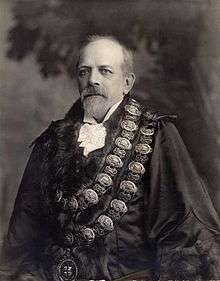
Gillott
- Died:
- Sir Samuel Gillott, 74, Australian politician former Mayor of Melbourne, after falling down the stairs during a visit to his native England
- Alfred H. Love, 82, American peace activist, founder and President of the Universal Peace Union
June 30, 1913 (Monday)
- Germany's Reichstag voted to increase the size of the nation's army by 136,000 officers and men.[26]
- Eleven boys in Lawrence, Massachusetts, were drowned in the collapse of a pier leading to a floating bathhouse in the Merrimack River. About forty young men were waiting for the doors to open and were stomping their feet while waiting for the doors to open.[72]
- The Mexican city of Guaymas fell to rebels.[26]
- Born:
- Alfonso López Michelsen, 32nd President of Colombia from 1974 to 1978; in Bogotá (d. 2007)
- Harry Wismer, American football broadcaster and owner of the AFL's New York Titans 1960–62; in Port Huron, Michigan (died in accident, 1967)
- Died: Frederick M. Shepard, 85, founder of the United States Rubber Company, of appendicitis. Shepard had also served as President of Goodyear Tire and Rubber for 41 years.[73]
References
- ↑ J. A. S. Grenville, The Major International Treaties of the Twentieth Century: A History and Guide with Texts, Volume 1 (Taylor & Francis, 2001) p50
- ↑ Richard A. Baker, 200 Notable Days: Senate Stories, 1787 To 2002 (Government Printing Office, 2006) p110
- ↑ Al Disbro, Images of America: Winona Lake (Arcadia Publishing, 2012) p61
- ↑ Julian P. Hume and Michael Walters, Extinct Birds (A&C Black, 2012) p123
- ↑ "Rebels Take Matamoras", New York Times, June 4, 1913
- 1 2 3 4 5 6 "Record of Current Events", The American Monthly Review of Reviews (June 1913), pp672-675
- ↑ Nigel Simeone, Paris: A Musical Gazetteer (Yale University Press, 2000)
- ↑ "Militant Throws King's Derby Colt", New York Times, June 5, 1913
- ↑ "Miss Davison Dead, Hailed as Martyr", New York Times, June 9, 1913
- ↑ "How the Derby Was Won", New York Times, June 5, 1913
- ↑ "Tisza to Form Cabinet", New York Times, June 8, 1913
- ↑ "Jack Johnson Gets a Prison Sentence", Milwaukee Journal, June 8, 1913
- ↑ David L. Fleitz, Shoeless: The Life and Times of Joe Jackson (McFarland, 2001) p76
- ↑ Carl Van Vechten and Edward Burns, The Letters of Gertrude Stein and Carl Van Vechten: 1913–1946 (Columbia University Press, 1986) p16
- ↑ "British Prince at Niagara", New York Times, June 7, 1913
- ↑ Walter R. Borneman, Alaska: Saga of a Bold Land (HarperCollins, 2004) p229
- ↑ "19 United Miners Indicted as Trust", New York Times, June 7, 1913
- ↑ "Palisade Pool Opened", New York Times, June 8, 1913
- ↑ "30,000 to March in Stadium Parade", New York Times, June 8, 1913
- ↑ "Berlin 1916", in Encyclopedia of the Modern Olympic Movement, John E. Findling and Kimberly D. Pelle, eds. (Greenwood Publishing Group, 2004) p66
- ↑ Donald E. Moggridge, Maynard Keynes: An Economist's Biography (Routledge, 1995) p224
- ↑ "Helen Kellar Has Rival in Graduate of Badger School", Milwaukee Journal, June 5, 1913, p1
- ↑ "Grand Vizier Slain by Assassins", New York Times, June 12, 1913
- ↑ Andrew Mango, Atatürk: The Biography of the founder of Modern Turkey (Penguin, 2002) p ii
- ↑ "Americans Take Moro Fort", New York Times, June 13, 1913
- 1 2 3 4 5 6 7 8 9 10 11 12 13 14 "Record of Current Events", The American Monthly Review of Reviews (July 1913), pp36-39
- ↑ "New Submarine Down 36 Hours", New York Times, June 12, 1913
- ↑ Niall Ferguson, Paper and Iron: Hamburg Business and German Politics in the Era of Inflation, 1897–1927 (Cambridge University Press, 2002) p31
- ↑ Abraham D. Lavender, Miami Beach in 1920: The Making of a Winter Resort (Arcadia Publishing, 2002) p26
- ↑ "Allies Accept Arbitration", New York Times, June 13, 1913
- ↑ "Sait Halim Pasha (1863–1921), in Historical Dictionary of Turkey, Metin Heper and Nur Bilge Criss (Scarecrow Press, 2009) p266
- ↑ "The History of the Animated Cartoon", by Earl Theisen, Journal of the Society of Motion Picture Engineers (September 1933), reprinted in A Technological History of Motion Pictures and Television (University of California Press, 1967) p85
- ↑ "Senators Favor Woman Suffrage", New York Times, June 14, 1913
- ↑ Arline Inge, A Marmac Guide to Los Angeles And Northern Orange County (Pelican Publishing, 2007) p305
- ↑ Fred Aftalion, History of the International Chemical Industry: From the "Early Days" to 2000 (Chemical Heritage Foundation, 2001) p57
- ↑ David A. Hounshell and John Kenly Smith, Science and Corporate Strategy: Du Pont R&D, 1902–1980 (Cambridge University Press, 1988) p172
- ↑ "Falling Rock Crushes 13 Men in Subway Cut, New York Times, June 15, 1913
- ↑ Gary Staff, German Battlecruisers 1914–18 (Osprey Publishing, 2006)
- ↑ Martin Collier and Bill Marriott, Colonisation and Conflict 1750–1990 (Heinemann, 2002)
- ↑ "Bud Bagsak (Philippines), Battle of", in Spanish-American & Philippine–American Wars, Jerry Keenan, ed. (ABC-CLIO, 2001) pp52-53
- ↑ E. San Juan, Jr., Working Through the Contradictions: From Culture Theory to Critical Practice (Bucknell University Press, 2004) p47
- ↑ "Reveals a Secret of Kaiser's Reign", New York Times, June 17, 1913
- ↑ "Dutch Election Is Close", New York Times, June 22, 1913
- ↑ "Again Pass Welsh Church Bill", New York Times, June 18, 1913
- ↑ Palle B. Petterson, Cameras Into the Wild: A History of Early Wildlife and Expedition Filmmaking, 1895–1928 (McFarland, 2011) p135
- ↑ "The First Arab Congress and the Committee of Union and Progress, 1913–1914", by David S. Thomas, in Essays on Islamic Civilization (Brill, 1976) p319
- ↑ Imperator, Biggest of Liners, in Port", New York Times, June 19, 1913
- ↑ Clifford D. Rosenberg, Policing Paris: The Origins of Modern Immigration Control Between the Wars (Cornell University Press, 2006) p139
- ↑ Robert A. Simons, et al., Indigenous Peoples And Real Estate Valuation (Springer, 2008) p178; Lauren Segal and Sharon Cort, One Law, One Nation: The Making of the South African Constitution (Jacana Media, 2012)
- ↑ "Collision Kills Thirteen", New York Times, June 20, 1913
- ↑ "Italians Rout Arabs", New York Times, June 21, 1913
- ↑ "Flies 117 Miles an Hour", New York Times, June 20, 1913
- ↑ "Australian Cabinet Resigns", New York Times, June 21, 1913
- ↑ Frank Crowley, Big John Forrest: 1847–1918 (University of Western Australia Publishing, 2000) p429
- ↑ Călin Hentea, Brief Romanian Military History (Scarecrow Press, 2007 p118
- ↑ Elizabeth Whitley Roberson, Tiny Broadwick: The First Lady of Parachuting (Pelican Publishing, 2001) p48; Thomas C. Parramore, First to Fly: North Carolina & the Beginnings of Aviation (University of North Carolina Press, 2003) p181
- ↑ "Zahle Forms Danish Cabinet", New York Times, June 22, 1913
- ↑ "Currency Message by Wilson To-Day", New York Times, June 23, 1913
- ↑ Josephus Daniels, The Life Of Woodrow Wilson 1856–1924 (Universal Book and Bible House, 1924, reprinted by Kessinger Publishing, 2004) p167
- ↑ "4 Dead, 60 Hurt As Grain Blows Up", New York Times, June 25, 1913
- ↑ "Servians Defeat Bulgars in Battle", New York Times, June 26, 1913
- ↑ Kari Palonen, et al., The Ashgate Research Companion to the Politics of Democratization in Europe: Concepts and Histories (Ashgate Publishing, 2008) p240
- ↑ Simon Mitton, Fred Hoyle: A Life in Science (Cambridge University Press, 2011) p101
- ↑ "Notes: Johnson looking for chance", by Jim Street, MLB.com, September 26, 2007
- ↑ LA Almanac.com
- ↑ "Duke of Sutherland Dead", New York Times, June 27, 1913
- ↑ "Plan to Dissolve Pacifics Approved", New York Times, June 29, 1913
- ↑ "Extend Japanese Treaty", New York Times, June 29, 1913
- ↑ Andre Gerolymatos, The Balkan Wars (Basic Books, 2008) p228
- ↑ Sneh Mahajan, British Foreign Policy: 1874–1914 (Routledge, 2002) p181 ; Richard C. Hall, Balkan Wars 1912–1913: Prelude to the First World War (Routledge, 2000) p1
- ↑ Steve Riach, Amazing but True Sports Stories (Hallmark Cards, Inc., 2004) p52
- ↑ "Eleven Boys Drowned", New York Times, July 1, 1913
- ↑ "Frederick M. Shepard Dies", New York Times, July 1, 1913
This article is issued from
Wikipedia.
The text is licensed under Creative Commons - Attribution - Sharealike.
Additional terms may apply for the media files.